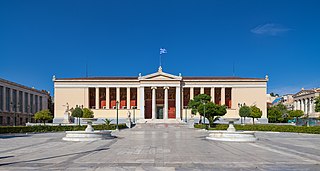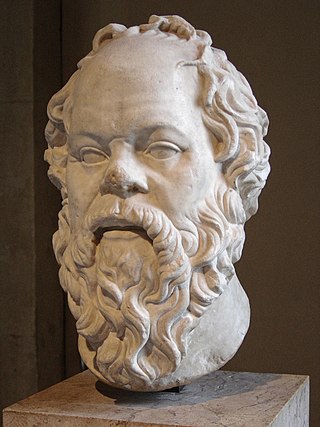Related Research Articles
Professional development, also known as professional education, is learning that leads to or emphasizes education in a specific professional career field or builds practical job applicable skills emphasizing praxis in addition to the transferable skills and theoretical academic knowledge found in traditional liberal arts and pure sciences education. It is used to earn or maintain professional credentials such as professional certifications or academic degrees through formal coursework at institutions known as professional schools, or attending conferences and informal learning opportunities to strengthen or gain new skills.

Education in Greece is centralized and governed by the Ministry of Education and Religious Affairs at all grade levels in elementary and middle school. The Ministry exercises control over public schools, formulates and implements legislation, administers the budget, coordinates national level university entrance examinations, sets up the national curriculum, appoints public school teaching staff, and coordinates other services.

The SOCRATES programme was an educational initiative of the European Commission; 31 countries took part. The initial Socrates programme ran from 1994 until 31 December 1999 when it was replaced by the Socrates II programme on 24 January 2000, which ran until 2006. This, in turn, was replaced by the Lifelong Learning Programme 2007–2013.
Lifelong learning is the "ongoing, voluntary, and self-motivated" pursuit of knowledge for either personal or professional reasons. It is important for an individual's competitiveness and employability, but also enhances social inclusion, active citizenship, and personal development.

The Lifelong Learning Programme 2007–2013 was the European Union programme for education and training.
The Postgraduate Certificate in Education (PGCE/PGCertEd) is a one- or two-year higher education course in England, Wales and Northern Ireland which provides training in order to allow graduates to become teachers within maintained schools. In England, there are two routes available to gaining a PGCE – either on a traditional university-led teacher training course or school-led teacher training.
The Certificate in Education is a professional qualification for teachers in the United Kingdom. There have been two incarnations of the Cert Ed over the years.
Open learning is an innovative movement in education that emerged in the 1970s and evolved into fields of practice and study. The term refers generally to activities that either enhance learning opportunities within formal education systems or broaden learning opportunities beyond formal education systems. Open learning involves but is not limited to: classroom teaching methods, approaches to interactive learning, formats in work-related education and training, the cultures and ecologies of learning communities, and the development and use of open educational resources. While there is no agreed-upon, comprehensive definition of open learning, central focus is commonly placed on the "needs of the learner as perceived by the learner." Case studies illustrate open learning as an innovation both within and across academic disciplines, professions, social sectors and national boundaries, and in business and industry, higher education institutions, collaborative initiatives between institutions, and schooling for young learners.

University Alliance (UA) is an association of British universities formed in 2006 as the Alliance of Non-Aligned Universities, adopting its current name in 2007.
The Leonardo da Vinci programme is a European Commission funding programme focused on the teaching and training needs of those involved in vocational education and training (VET). The programme is part of the European Commission's Lifelong Learning Programme 2007–2013 and aims to build a skilled and mobile workforce across Europe.
The Institute for Learning (IfL) was a voluntary membership, UK professional body. It ceased operating on 31 October 2014. Although precise membership figures and statistical details had been removed from IfL's webpage prior to its closure, at the end of financial year 2013-2014 IfL were reported as having only 33,500 of their 200,000 members remaining.
The Business and Technology Education Council (BTEC) is a provider of secondary school leaving qualifications and further education qualifications in England, Wales and Northern Ireland. While the T in BTEC stood for Technical, according to the DfE (2016) it now stands for Technology. BTECs originated in 1984 and were awarded by Edexcel from 1996. Their origins lie in the Business Education Council, formed in 1974 to "rationalise and improve the relevance of sub-degree vocational education". They are the responsibility of the Minister of State for Skills, Apprenticeships and Higher Education in the Department for Education.
The Preparing to Teach in the Lifelong Learning Sector (PTLLS) qualification, sometimes referred to colloquially as "Petals", is an initial teacher training qualification within the British Qualifications and Credit Framework (QCF). It is studied at QCF Level 3 or 4, awarded over 2006 to 2018 and was for those new to teaching, or who wanted to start out as associate teachers, or who were teaching in the United Kingdom and required certification or qualification in the Further Education (FE) or Lifelong Learning sector of education. It has since been superseded by the Award in Education and Training qualification.
Lifelong Learning UK (LLUK) was one of the independent, Sector Skills Councils (SSCs) for UK employers in the lifelong learning sector. It was responsible for the professional development of all those working in community learning and development, further education, higher education, libraries, archives and information services, and work based learning across the UK.
Initial Police Learning and Development Programme (IPLDP) is the curriculum for the initial training of police officers within England and Wales.
NCFE is an awarding organisation and registered educational charity providing qualifications in England, Wales and Northern Ireland. NCFE is regulated by Ofqual in England, and recognised by Qualifications Wales and the Council for the Curriculum, Examinations & Assessment in Northern Ireland.
The Diploma in Teaching in the Lifelong Learning Sector (DTLLS) was an initial teacher training qualification, studied at QCF Level 5 or 7, for teaching in Further Education (FE) and the lifelong learning sector of education in the United Kingdom. The DTLLS was the highest of the teaching qualifications specifically for this sector of education, the others being the Certificate in Teaching in the Lifelong Learning Sector (CTLLS) and the Preparing to Teach in the Lifelong Learning Sector (PTLLS) qualifications. The DTLLS at QCF Level 7 was equivalent to a Post-Graduate Certificate in Education in Lifelong Learning or Post-Compulsory Education and Training (PCET). The DTLLS was phased out along with the CTLLS and the PTLLS, and replaced with the Diploma in Education and Training qualification at QCF Level 5. The framework for such qualification has been changed to (RQF) Regulated Qualification Framework. There are also different routes to be a qualified teacher in UK.
The Qualifications and Credit Framework (QCF) Level 3/4 Certificate in Teaching in the Lifelong Learning Sector (CTLLS) is an initial teacher training qualification, studied at QCF Level 3 or 4, for teaching in Further Education (FE) and the lifelong learning sector of education in the United Kingdom.
The Diploma in Education and Training is an initial teacher training qualification, studied at RQF Level 5, for teaching in Further Education (FE) and the lifelong learning sector of education in the United Kingdom. Study for the Diploma in Education and Training typically follows the completion of the Certificate in Education and Training at RQF Level 4 and the Award in Education and Training at RQF Level 3. The Diploma in Education and Training qualifies a teacher for Qualified Teacher Learning and Skills (QTLS) status from the Society for Education and Training. The Diploma in Education and Training replaces the Diploma in Teaching in the Lifelong Learning Sector. The Diploma in Education and Training is an industry standard qualification for those teaching in the post-16 sector.
The Certificate in Education and Training is an initial teacher training qualification, studied at Regulated Qualifications Framework Level 4, for teaching in Further Education and the lifelong learning sector of education in the United Kingdom. Study for the Certificate in Education and Training typically follows the completion of the Award in Education and Training at Regulated Qualifications Framework Level 3, and precedes the start of the Diploma in Education and Training at Level 5. The Certificate in Education and Training qualifies an education practitioner for associate membership of the Society for Education and Training. The Certificate in Education and Training replaces the Certificate in Teaching in the Lifelong Learning Sector. The Level 4 Certificate in Education and Training was developed as a qualification for Associate Teachers. The qualification does not itself entitle the holder to apply for Qualified Teacher Learning and Skills.
References
- ↑ City & Guilds (May 2013). "For the attention of the Initial Teacher Training PTLLS/CTLLS/DTLLS tutors, teachers and coordinators" (PDF). Archived from the original (PDF) on 19 December 2013.